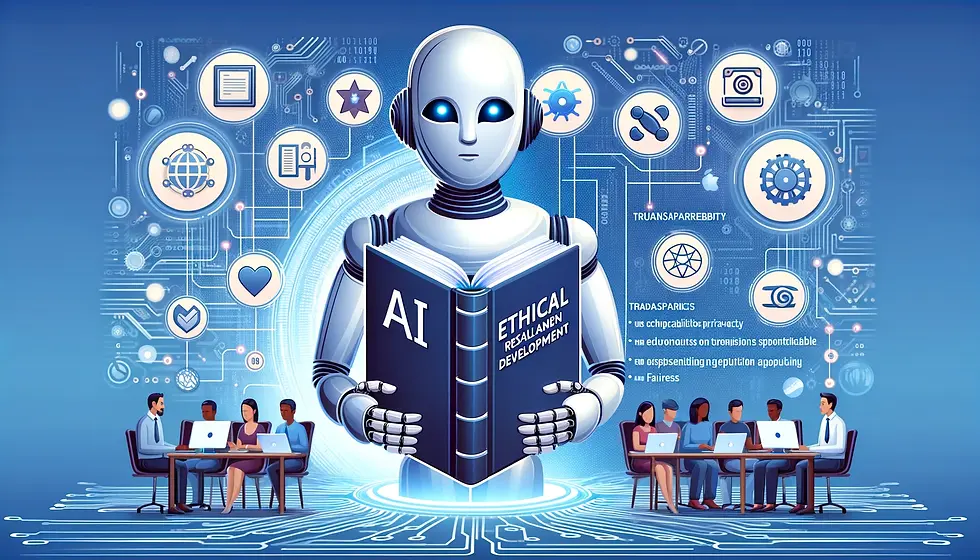Ethical AI Development: Guidelines and Best Practices for Responsible AI Innovation
- ERLOUISE M. VARGAS
- Jun 8, 2024
- 3 min read

The rapid advancement of Artificial Intelligence (AI) technology has transformed numerous industries, promising unprecedented benefits and efficiencies. However, with great power comes great responsibility. The ethical implications of AI development are profound, encompassing issues such as bias, privacy, transparency, and accountability. This article delves into the essential guidelines and best practices for ensuring that AI technology is developed with robust ethical considerations, fostering trust and safeguarding societal values.
The Importance of Ethical AI Development
Ethical AI development is not just a matter of compliance or risk management; it is a foundational element for sustainable innovation. AI systems are increasingly making decisions that impact people's lives, from hiring practices to medical diagnoses. If these systems are biased or lack transparency, the consequences can be harmful and far-reaching. Ensuring ethical AI development helps build public trust, promotes fairness, and supports the broader acceptance and success of AI technologies.
Guideline 1: Fairness and Bias Mitigation
One of the primary ethical concerns in AI development is bias. AI systems can inadvertently perpetuate or even exacerbate existing biases present in training data. To address this, developers must implement fairness and bias mitigation strategies. This involves using diverse and representative datasets, continuously monitoring AI systems for bias, and employing techniques such as algorithmic auditing and fairness-aware machine learning models. By actively working to reduce bias, developers can create more equitable AI systems.
Guideline 2: Transparency and Explainability
Transparency is crucial for building trust in AI systems. Users and stakeholders need to understand how AI systems make decisions. This is where explainability comes in—the ability to explain the workings of an AI model in a comprehensible way. Developers should prioritize creating models that are interpretable and provide clear, understandable explanations for their outputs. This not only enhances trust but also allows for better accountability and oversight.
Guideline 3: Privacy and Data Protection
AI systems often rely on vast amounts of data, raising significant privacy concerns. Developers must adhere to stringent data protection regulations and adopt best practices for data privacy. This includes implementing strong data encryption, ensuring data anonymization, and obtaining explicit consent from users before collecting and using their data. Protecting users' privacy is essential for maintaining trust and complying with legal and ethical standards.
Guideline 4: Accountability and Governance
Establishing clear accountability frameworks is critical in ethical AI development. This involves defining roles and responsibilities within the development team and ensuring there are mechanisms for oversight and accountability. Ethical AI governance also includes creating policies and procedures for addressing ethical issues, such as bias or misuse of AI systems. By having robust governance structures, organizations can better manage ethical risks and ensure responsible AI deployment.
Guideline 5: Human-Centered Design
AI systems should be designed with a human-centered approach, prioritizing the needs, values, and well-being of users. This involves engaging with diverse stakeholders during the development process, conducting user testing, and iterating based on feedback. Human-centered design ensures that AI technologies are not only effective but also align with human values and ethical principles, enhancing user satisfaction and trust.
Guideline 6: Continuous Monitoring and Improvement
Ethical AI development is not a one-time effort but an ongoing process. Developers must continuously monitor AI systems for ethical issues and make necessary improvements. This includes regular audits, updating datasets, and refining algorithms to address any emerging biases or ethical concerns. By adopting a proactive approach to monitoring and improvement, developers can ensure that their AI systems remain ethical and effective over time.
Conclusion: The Path to Ethical AI
Developing AI technology with ethical considerations is essential for its successful integration into society. By adhering to guidelines such as fairness and bias mitigation, transparency, privacy protection, accountability, human-centered design, and continuous improvement, developers can create AI systems that are not only innovative but also ethical and trustworthy. As AI continues to evolve, maintaining a strong focus on ethical principles will be crucial for fostering a positive impact and ensuring the technology benefits all of humanity.




Comments